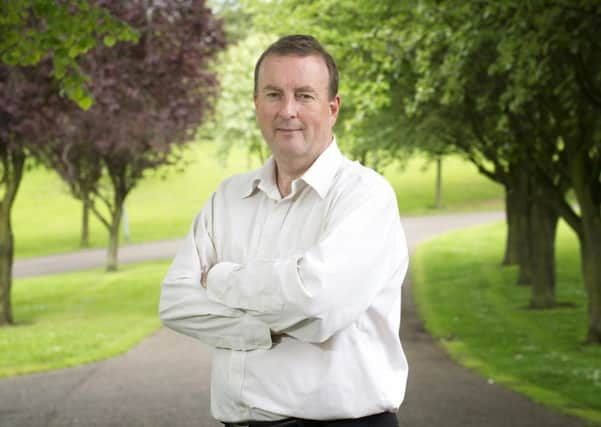Interview: Simon Allan on Canvas growth


But a bus hoarding passed on the way to this morning’s meeting in Glasgow’s city centre is testament to the degree to which that stereotype has been turned on its head. Smirnoff – one of the world’s slickest and most valuable brands – proclaims to be “up for it” in the Great Outdoors. From the look of the putative campers pictured, the message is squarely aimed at those not many years beyond the legal drinking age.
“We do get quite a lot of halo effect at this time of year from the music festivals,” concedes Simon Allan, managing director of Canvas Holidays.
Advertisement
Hide AdAdvertisement
Hide AdLaunched in 1965 with two campsites in northern France, Canvas today offers holidays at more than 90 sites across eight European countries. The Dunfermline-based company is now gearing up for further growth under its new owner, France’s Vacalians Group, which acquired Canvas earlier this year.The popularity of camping in the UK has been steadily increasing since the early 1990s, helped more recently by the emergence of high-end accommodation spanning treehouses, yurts and luxury tents. But camping’s following is still dwarfed by that on the Continent, where Canvas is acquiring new customer bases as part of the deal with Vacalians.
“There will be an element of glamping in our growth, but the big expansion is not going to come from our UK and Ireland source markets – it is going to be from places like Holland and Germany, and also from Eastern Europe,” Allan says.
“We will have total responsibility for source markets in Northern Europe, while our parent company will keep control of source markets in Southern Europe.”
It’s a massive shift in mindset for the business. Under previous owner Wyndham, Canvas required relatively little marketing to fill its pitches, but in conjunction with its new source markets it is also adding 35 new sites across Europe. On top of that, it will also sell holidays into Vacalians-branded sites.
This will lead to substantial, but as yet unquantified, expansion at the Fife headquarters, where some 70 full-time staff are currently employed. At the height of the summer holidays, Canvas also has about 220 seasonal workers.
The company will require additional marketing and administrative staff as it moves towards its target of generating €100 million in turnover within the next five years, nearly a fourfold increase on its latest annual revenues.
“It is a very ambitious strategic plan, but the stock is available and the people are out there,” Allan says. “The challenge now is to convince them to take their holiday through us.”
It will be the biggest undertaking in his career, which spans nearly 25 years with Canvas. A geography graduate working in the timber industry in the late 1980s, Allan loved the outdoors from an early age. However, a climbing accident in Wales left him in hospital for six months recovering from a back injury, during which time he decided he needed a change of direction.
Advertisement
Hide AdAdvertisement
Hide AdIt was at that point he came across “a quirky little company” called Canvas, which at that time was still owned by its founders, husband-and-wife team Jim and Margaret Cuthbert. Keen to see a bit more of the world, Allan took a three-month contract as a children’s entertainer in France.
Accommodation back then was rudimentary, he recalls, with small tents and communal sanitation where hot water was available for a fee. Mobile homes were “very rare beasts, and very basic”.
“Even going back to things like communication, you were lucky if you worked on a site that had a fax machine,” he says. “Now there is wifi available in at least one part of all of our campsites, and some have wifi throughout.” Other aspects have similarly evolved “beyond all recognition”. From tended fields with the occasional electrical hook-up, sites these days are more like resorts, with swimming pools, water slides, shops, restaurants and spas.
“One of the biggest challenges we have is getting past this notion that going camping is about sitting in a wet tent in a wet field,” he says.
From his initial contract, Allan went on to work through the winter in the company’s contact centre. He took his first central office office role as a purchasing supervisor in the mid-Nineties. By that point the Cuthberts had transferred Canvas’s head office from its previous location in Hartford to Scotland, to be nearer their home town of Kinross.
The founders retired in 1992 and sold the business to Andrew Salvesen, who a few years later passed on ownership to a management buy-out team. They sold out in 2004 to Cendant, the predecessor of the Wyndham Group.
Wyndham – which prefers to lease accommodation rather than own it – put Canvas up for sale as the company’s need for investment grew increasingly pressing.
Allan says the firm will now have access to the roughly £5m annually required to replenish tents, mobile homes and other inventory.
Advertisement
Hide AdAdvertisement
Hide Ad“We have been constrained for the last five years, so it is a mindset change for us to say the world is our oyster, let’s get out there and grow,” says Allan. “Like any change, it has its challenges, but these are exciting times.”